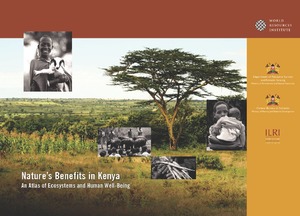Assessing household poverty and wellbeing: a manual with examples from Kutai Barat, Indonesia
The manual reflects the results of a 3-year participatory learning process that comprised many meetings, workshops, village case studies, a baseline survey of 20 poor villages, two monitoring trials in another 20 villages, and a full monitoring survey of all 223 villages in Kutai Barat. The principal purpose of this manual is to provide technical guidelines and background information to poverty assessors at district, subdistrict and village level in Kutai Barat. Therefore, the manual is structured in modules according to the tasks of the assessors.
Capturing nested spheres of poverty: a model for multidimensional poverty analysis and monitoring
In this paper the authors discuss recent trends in poverty concepts and suggest a locally adapted multidimensional model for measuring and monitoring poverty. The model comprises nested layers with subjective wellbeing in the centre surrounded by a core of health, wealth and knowledge, and a context that includes natural, economic, social and political spheres, as well as service and structural aspects.
Hacia el bienestar de las comunidades forestales: guía para la acción de los gobiernos locales
Governments in many countries are decentralising to give more control over decision making and budgets to local administrations. One expectation of this change is that local governments will more effectively and efficiently respond to the poorest citizens in their jurisdictions. Decentralisation is especially significant to forest communities, which have historically benefited little from government services and poverty reduction programmes because of their physical isolation and social marginalisation.
Kemiskinan dan desentralisasi di Kutai Barat: dampak otonomi daerah terhadap kesejahteraan Dayak Benuaq
Laporan penelitian ini menyajikan hasil penelitian lapangan yang dilakukan di Kutai Barat, Kalimantan Timur sebagai bagian dari proyek Menjadikan Pemerintah Daerah Lebih Tanggap Terhadap Kemiskinan: Pengembangan Indikator dan Alat untuk Mendukung Pengembangan Penghidupan yang Berkelanjutan dalam Desentralisasi yang didanai CIFORBMZ. Laporan menunjukkan bahwa dampak otonomi daerah terhadap kesejahteraan Dayak Benuaq, masyarakat yang bergantung pada hutan, kelompok mayoritas masyarakat di Kutai Barat.
Menuju kesejahteraan dalam masyarakat hutan: buku panduan untuk pemerintah daerah
Governments in many countries are decentralising to give more control over decision making and budgets to local administrations. One expectation of this change is that local governments will more effectively and efficiently respond to the poorest citizens in their jurisdictions. Decentralisation is especially significant to forest communities, which have historically benefited little from government services and poverty reduction programmes because of their physical isolation and social marginalisation.
Menuju kesejahteraan: pemantauan kemiskinan di Kutai Barat, Indonesia
Kemiskinan adalah masalah yang persisten di Indonesia. Tujuh tahun setelah dimulainya desentralisasi hanya terlihat sedikit peningkatan pada kesejahteraan masyarakat. Pemerintah daerah telah memperoleh kesempatan dan tanggung jawab baru untuk melaksanakan pembangunan, tetapi hanya beberapa kabupaten saja yang mempunyai kemampuan dan pengalaman yang diperlukan untuk mengurangi kemiskinan secara efektif. Laporan ini menyajikan potret kemiskinan dan kesejahteraan di Kutai Barat, sebuah kabupaten yang baru didirikan pada tahun 1999.
Menuju kesejahteraan: pemantauan kemiskinan di Malinau, Indonesia
Poverty is a persistent problem throughout Indonesia. With decentralization, local governments had a new direct role in alleviating poverty and local wellbeing. At the same time they could do so in accordance with local realities and development needs. Yet, there is little improvement in the wellbeing of rural people. Local governments may lack the necessary capacity and experience to reduce poverty effectively. This report shows how a local specific monitoring system can be developed and applied.
Nature's benefits in Kenya. An atlas of ecosystems and human well-being
This report provides a new approach to integrating spatial data on poverty and ecosystems in Kenya. It is endorsed by five permanent secretaries in Kenya and with a foreword by Wangari Maathai (recipient of the 2004 Nobel Peace Prize). It provides a new approach to examining the links between ecosystem services (the benefits derived from nature) and the poor. Through a series of maps and analyses, the authors focus on the environmental resources most Kenyans rely on such as soil, water, forest, rangeland, livestock, and wildlife.
Poverty and decentralisation in Kutai Barat: the impacts of regional autonomy on Dayak Benuaq wellbeing
Poverty and forests: multi-country analysis of spatial association and proposed policy solutions
This paper examines poverty and deforestation in developing countries as linked problems and focuses on policies that can favour poverty alleviation in forested regions. The paper encompasses two elements: analysis of the spatial coincidence between poverty and forests, and proposed policy options for reducing poverty in forested areas.



